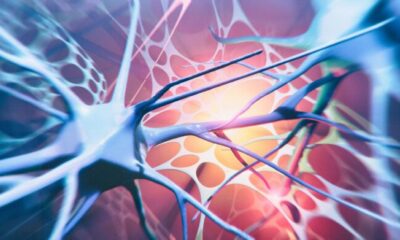Science
MIT Researchers Explore Ionic Liquids as Alternative Biological Solvents

A recent study by researchers at the Massachusetts Institute of Technology (MIT) suggests that ionic liquids could serve as viable biological solvents in environments previously thought inhospitable for life. This groundbreaking work, which includes insights from ongoing missions to investigate life on Venus, indicates that these liquids might form naturally under extreme conditions found on certain exoplanets.
Ionic liquids, essentially salts that are liquid at around room temperature, consist solely of either negatively or positively charged ions. Their unique properties make them particularly interesting as potential solvents for life. Unlike water, ionic liquids possess a “polar” nature that allows them to dissolve other polar molecules, including vital biomolecules such as enzymes. This characteristic is critical for any solvent that supports life’s biochemical processes. Additionally, ionic liquids remain stable at much higher temperatures than liquid water, and they exhibit low vapor pressure, making them resistant to evaporation even in minimal atmospheric conditions.
The research emerged from a challenge faced by scientists attempting to isolate organic compounds in Venus’s atmosphere, rich in sulfuric acid. As they worked to remove sulfuric acid by evaporation, they discovered persistent residues, leading them to conclude that reactions were occurring between glycine, an organic compound, and sulfuric acid, resulting in the formation of ionic liquids. Such liquids are rarely found naturally on Earth, with one notable exception being the mixing of venoms from competing ant species.
Recognizing the abundance of organic compounds throughout the solar system, the researchers explored the potential for ionic liquids to form on other planets. They set up experiments on slabs of basalt, simulating planetary surfaces, and introduced varying temperatures and pressures to a mix of sulfuric acid and glycine. The results confirmed that ionic liquids could indeed be created and maintained under these conditions.
While the actual environments in space are likely harsher than those simulated in the lab, the researchers believe that excess sulfuric acid could be absorbed into rock pores, mitigating its effects. Furthermore, the organic molecules and salts would need to withstand intense radiation, but they could find protection from magnetic fields or the very rocks that help eliminate sulfuric acid.
This research marks a significant advance in our understanding of potential forms of life beyond Earth. Although it does not provide definitive proof of extraterrestrial life, it opens new avenues for astrobiologists in their quest to explore the universe’s diverse environments. The implications of this study could inspire future research efforts and reframe the criteria for habitability beyond the reliance on liquid water.
In conclusion, the findings from MIT underline the versatility of life’s potential solvents and broaden the scope of environments that could support biological processes. As scientists continue to investigate these possibilities, the search for life on distant planets gains new momentum, guided by innovative insights into the chemical foundations of life.
-

 Technology5 months ago
Technology5 months agoDiscover the Top 10 Calorie Counting Apps of 2025
-

 Health2 months ago
Health2 months agoBella Hadid Shares Health Update After Treatment for Lyme Disease
-

 Health3 months ago
Health3 months agoErin Bates Shares Recovery Update Following Sepsis Complications
-

 Technology4 months ago
Technology4 months agoDiscover How to Reverse Image Search Using ChatGPT Effortlessly
-

 Technology1 month ago
Technology1 month agoDiscover 2025’s Top GPUs for Exceptional 4K Gaming Performance
-

 Technology2 months ago
Technology2 months agoElectric Moto Influencer Surronster Arrested in Tijuana
-

 Technology5 months ago
Technology5 months agoMeta Initiates $60B AI Data Center Expansion, Starting in Ohio
-

 Technology5 months ago
Technology5 months agoRecovering a Suspended TikTok Account: A Step-by-Step Guide
-

 Health4 months ago
Health4 months agoTested: Rab Firewall Mountain Jacket Survives Harsh Conditions
-

 Lifestyle5 months ago
Lifestyle5 months agoBelton Family Reunites After Daughter Survives Hill Country Floods
-

 Technology4 months ago
Technology4 months agoHarmonic Launches AI Chatbot App to Transform Mathematical Reasoning
-

 Technology3 months ago
Technology3 months agoUncovering the Top Five Most Challenging Motorcycles to Ride





















